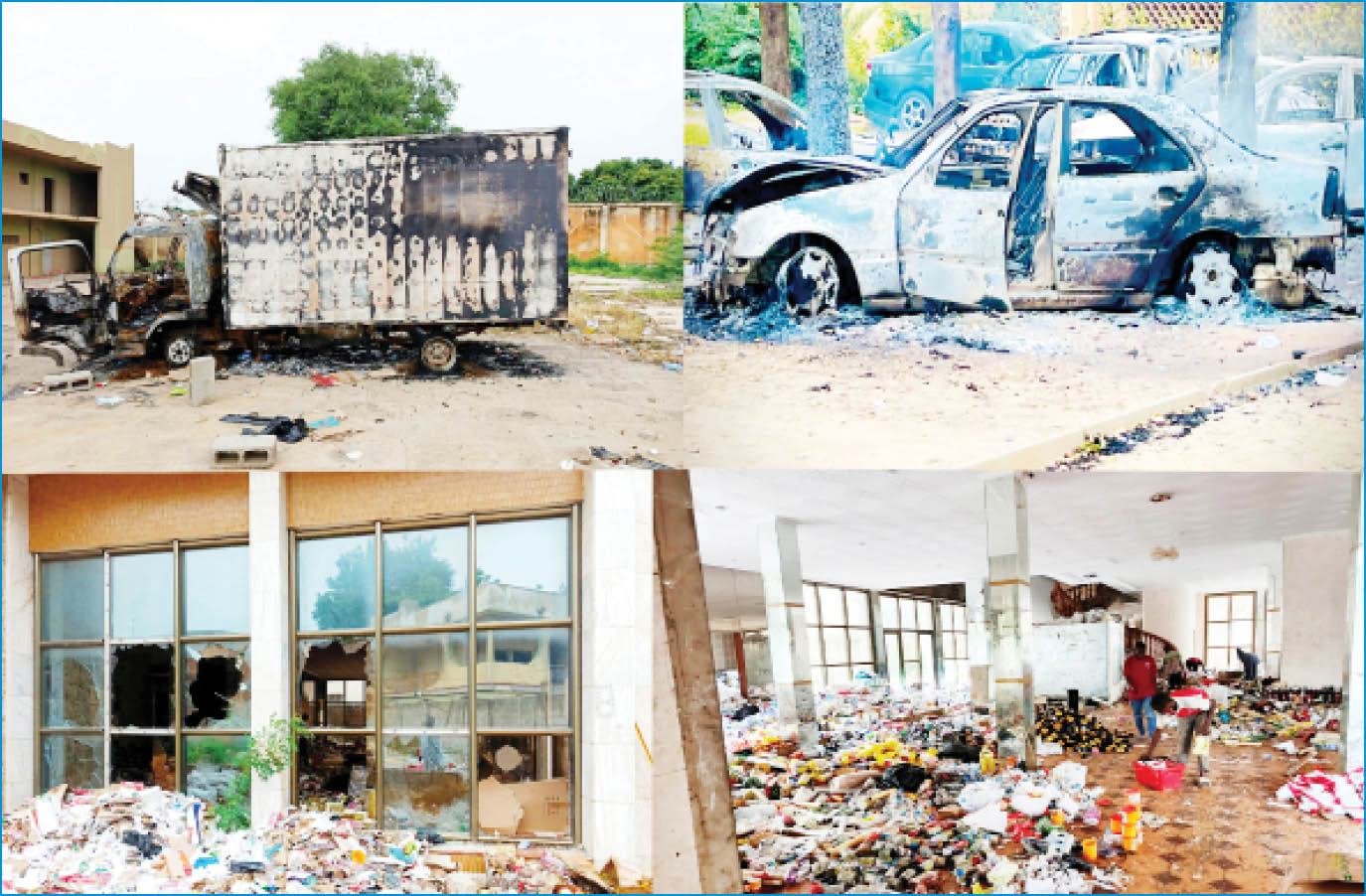Matters arising from days of rage
Mercifully, the 10 days of rage expired on Saturday. It left in its wake a severely traumatised nation that had to endure, in those 10 long days, idleness, loss of income, widespread violence, and the overhanging fear of the unknown. I suspect there would be gnashing of teeth within the government circle, considering there had […]

properties vandalized and looted when hoodlums hijacked #endbadgovernance protest in kano
Mercifully, the 10 days of rage expired on Saturday. It left in its wake a severely traumatised nation that had to endure, in those 10 long days, idleness, loss of income, widespread violence, and the overhanging fear of the unknown. I suspect there would be gnashing of teeth within the government circle, considering there had been this strong show of challenge within this short while in its tenure. The challenge was lighter in the southern states as if by design.
As I observed last week, there was hardly a whimper from the southeastern states where in the past wholesome activism has been evident in contesting the most mundane of many national issues. This time there seemed to have been unanimity among their political leaders not to support the protest. In a well-circulated video, one of the leaders, Ben Kalu, the Deputy Speaker of the House of Representatives, was seen hectoring citizens of the zone, “Ndigbos stay away from the protest. They will target you and they will waste you – – Sit at home. If there’s any sit-at-home that should be effective, not the one you do on Mondays, let it be the one that will happen in this protest,” he said. They complied, without exception.
One or two states in the south-south made a feeble show which amounted to not much. Similar weak attempts were made in the western zone. The most surprising was the damp acceptance of the protest in Lagos State. From time immemorial Lagos had always been the hub of protests. This time, nothing happened there. Well, we may admit that on the first day of the protest, there was a well-choreographed movement to the Government House in Ikeja to present a petition to the governor. It was a peaceful mass movement, almost carnival-like with the police in attendance every step of the way. Nothing untoward happened thereafter.
From day one, the protest had its hottest impact in all three zones of the northern states. Hotspots included Jos in Plateau State, those parts of Nasarawa (New Nyanya, Karu) and Niger states (Suleja) closest to Abuja, Bauchi, Nguru, and Damaturu in Yobe State, Maiduguri, Dutse, Kano City, Katsina, Sokoto, Gusau and Kaduna. I would rather spare the reader the sordid occurrences as most of it has been well covered in the media throughout the protest period. Suffice it to say that it was only in these parts that things were so out of hand that it became necessary to clamp 24-hour curfew on the citizenry.
- Nigeria’s protest saga: A cry for inclusivity and equal rights
- Hunger protest: Nigeria needs total overhaul – Shettima
The riotous protest in the north has been attributed to the well-known factors of endemic poverty, illiteracy, the army of out-of-school children and out-of-job youths. Without any identifiable leadership, these rioters laid siege to some of the largest settlements in the country, looting and destroying government properties at will. Before the riots were contained many had unfortunately died, and unquantifiable damage has been done to the local economies. It was easily foreseen that this would happen yet the government was probably either overwhelmed or helpless to take action.
I guess what was missing in the riotous scenario of the northern part of the country was the absence of political leaders to come out and help assuage the protesters. From local councillors to council chairmen, elected representatives etc., all disappeared when they were sorely needed to come to the streets to talk to aggrieved protesters. Someone had opined, and I agree with him, that there seems to be a disconnect between them and the teeming electorate of the north. One wonders whether it is because the elected officials have realised that they cannot tackle these endemic problems or they lack the will to confront the problems that they end up playing hide and seek with those they claim to represent.
Admittedly, these problems have been there for ages, defying many attempts to solve them. However, the problems were steeply exacerbated by the sudden removal of petroleum subsidies and the floating of the national currency last year. Okay, it was a courageous thing to do to kickstart a comatose economy but the measures were implemented immediately as of June last year without sufficient explanation. To worsen matters there was nothing on the ground put by the government to help mitigate the concomitant effects of rising prices and inflation.
Nevertheless, it is instructive to note that the riots have been a wake-up call. Now that we have seen the last day of the 10 days of rage, we should take serious stock of what happened and what to do to avoid a repeat. I am glad some of the politicians in the government have come out doing this kind of stocktaking. Vice-President Kashim Shettima has been all over the media these last few days doing this kind of exercise. I listened to him on Sunday morning on Radio France International (RFI) and what I came away with is that he is going to lead a crusade to tackle headlong many of the social malaise disorienting the progress of the north. He is taking along with him on this voyage the governors of the northern states, all notable businessmen, leading politicians and public servants of repute.
We eagerly await details.
